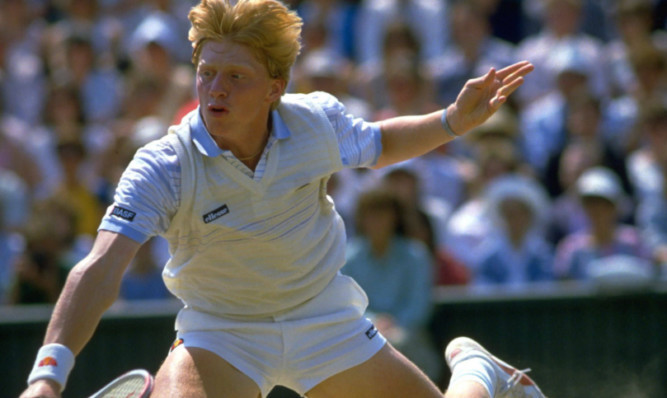
AS sporting fairy tales go, Boris Becker’s win at Wimbledon in 1985 takes some beating.
Playing in the tournament for only the second time, the 17 year-old German astonished the sporting world by becoming the youngest-ever winner of the world’s top tennis title.
With homegrown tennis heroes thin on the ground, the British public took Boris to their heart, and he reciprocated. These days he has a home in Wimbledon, two of his four children were born in the UK, and he still spends much of his year here.
Looking back, it seems inevitable that he should become so closely associated with the famous courts.
Speaking at the launch of this pictorial autobiography, published to mark the 30th anniversary of his first Wimbledon win, he explained: “We didn’t have much tennis on television in Germany, so for little Boris growing up in the mid ’70s, there was only one tournament to watch, and that was Wimbledon.
“Watching Wimbledon then, there was only one winner, and that was Bjorn Borg, so he was my childhood hero. We had very different styles, but I loved his attitude.”
His own outstanding ability and supportive parents saw Boris win his first tournament when he was just six, and he became the leading German male at just 14.
He recalled that tennis then was still something to be done for fun rather than to carve out a lucrative career.
“It wasn’t really known as a profession. It was still regarded as a pastime, something you did after school or at the weekends.”
That all changed with his win, which was helped by the fact that he was able to escape much of the hype.
“My English wasn’t very good so I didn’t read the papers and I was living in my own little bubble.
“It wasn’t until the later rounds that I started to think that it was getting serious, and I wasn’t really thinking about the final until I woke up that morning.”
Despite becoming a sporting icon almost overnight, Boris revealed not everyone thought his future lay in tennis.
“After winning Wimbledon for the first time I had an interview with my school principal to discuss whether I should stay on at school.
“I explained that things were going pretty well for me, but he asked what would happen if I broke a leg.
“I explained that things would still be pretty good.
“Outside the school there were a thousand fans chanting my name and asking for an autograph!”

Enjoy the convenience of having The Sunday Post delivered as a digital ePaper straight to your smartphone, tablet or computer.
Subscribe for only £5.49 a month and enjoy all the benefits of the printed paper as a digital replica.
Subscribe